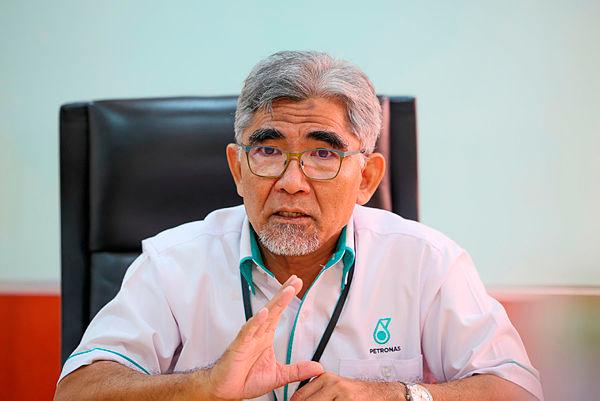KUALA NERUS: The climate change crisis, lack of resources, and degradation of eco-systems are among the long-term global issues today affecting environmental sustainability.
Recognising this phenomenon, Petroliam Nasional Bhd (Petronas) has made strides in making the oil and gas (O&G) company the first in Southeast Asia to declare its aspiration of achieving a net zero carbon emissions target by 2050 (NZCE 2050).
This noble effort is also supported by Institut Teknologi Petroleum Petronas (INSTEP), one of Petronas’ subsidiaries, which plays a role in producing a skilled technical workforce in the O&G industry.
INSTEP chief executive officer Idris Ibrahim said to realise this agenda, INSTEP focuses on two important aspects which are the provision of facilities with a sustainable concept and development of human capital in line with Petronas’ mission and vision as a dynamic global energy group.
In efforts to reduce carbon dioxide emissions into the atmosphere, INSTEP has implemented a solar photovoltaic (PV) system in the campus environment. This effort was carried out in collaboration with clean energy solutions provider Gentari Sdn Bhd, a subsidiary of Petronas.
Idris said the installation of the solar photovoltaic system, with a capacity of 1.4MWp (megawatt peak), on the roof of academic buildings, administrative offices, and walkways has reduced 30 per cent of electricity consumption from fuel sources per year. It is clearly proven through monthly electricity bill savings.
The installation of the five kilowatts (kW) solar photovoltaic system at the INSTEP training facility has been implemented for learning purposes, including research, data analysis and training activities.
“By saving 30 per cent of this electricity resource, we have also succeeded in reducing the emission of 1285.47 tonnes of carbon dioxide equivalent (tCO2e) in the air annually. With today’s development, we aim to reach the target of 40 per cent in 2030,“ he said when met by Bernama at INSTEP.
Apart from this, Idris said INSTEP is also the first Petronas subsidiary to implement a food recycling programme through the use of compost technology to be used as organic fertiliser.
He said every year an estimated 15,000 kilogrammes of food waste is successfully processed into organic fertiliser which is then used to fertilise plants around the institute.
“The composting process also contributes to reducing the effects of greenhouse gas into the atmosphere. This amount equals the carbon dioxide absorption capacity of 6,000 trees per year,“ he said.
INSTEP has also taken progressive steps by discouraging the use of plastic bottles and replacing them with recyclable beverage containers on campus in March.
According to Idris, as an alternative, his team has provided water filter machines on campus for the use of INSTEP staff and students.
“We also have two solar-powered motorcycles and these are used by INSTEP security personnel for monitoring purposes on campus,” he said.
“All these efforts are being done to achieve the group’s objective, and we are also working towards creating a ‘green campus’ at some point in the future,“ he said.
However, Idris said providing facilities alone is not enough because it needs to be done in tandem with the development of human resources or a workforce capable of bringing sustainable aspirations into their every work routine or daily life.
Idris said in INSTEP, every learning or training module enacted will include sustainable elements to inculcate these values among students who will join the industry upon completion of training.
“In INSTEP, we give early emphasis to the 400 current students on the concept of sustainability through training modules or learning experiences since they first joined the class.
“The emphasis on ‘mindset’ is very important to ensure they bring the sustainability culture to their workplace and further support Petronas’ sustainability agenda,“ he said.
In order to ensure the application of stronger values among students and the over 200 employees, Idris said INSTEP also implemented several projects among the community as part of social impact programmes.
‘The Planting Tomorrow (Menyemai Masa Hadapan): Edu-Lestari’ (programme), involving nearly 200 Year Four and Year Five students from eight primary schools around Kuala Nerus and Setiu, is one of the successful initiatives that has had an impact on both groups.
“This programme is aimed at encouraging interest in the sustainability aspect through fun learning activities. The students involved are brought to the INSTEP campus to be exposed to Science and Mathematics subjects outside the classroom through various activities including tree-planting activities, which require them to study the growth process involved. They will be brought back here (INSTEP) to monitor the growth of the trees they planted,“ he said.
At the same time, Idris also said INSTEP took a unique initiative, a clothes recycling campaign, which was carried out together with various agencies including local authorities and appointed clothing recycling companies.
As a result, 40 tonnes of used clothes, donated by the public including Petronas staff, were collected.
Idris added that all the proceeds from the sales were handed over to the National Cancer Council (MAKNA) to help needy patients.
Donated items such as bags, belts, blankets, and curtains will be sold as used items whereas those items that are damaged will be processed for other uses. This small initiative supports the development of a circular economy, and it can have a positive impact on the problem of waste overflow in land areas and indirectly reduce the issue of global warming.–Bernama
Idris Ibrahim-Bernamapix









